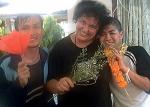Max’s Day
Since I spoke to you last, I have spend one king-hell of a strange day. The morning was spent exchanging e-mails with one of the Mexican nationals who works for the sinisterly named ‘Citizen’s Benefits Office’ at our embassy in Mexico City. As you know I’ve been trying to straighten out my seriously screwed up Social Security account for the last four or five months.
Now, Eunice, before I moved down here I would have laughed out loud at anybody who told me there was any more hide-bound, ineffective, opaque, inefficient or surreal organization on the face of god’s green earth than the U.S. Federal bureaucracy. That was before I learned the Mexican ways of conducting business. They are simply incomprehensible to anyone not born and raised here. The first rule to remember is that Mañana means only one thing: “Not today.” Staffing a Federal bureaucratic department with Mexican Nationals was a strategic blunder exceeded in our lifetimes only by Bush’s Iraqi war.
My early afternoon featured a few hours spent with the local Consular Services Officer, in his extremely odd offices next to a booming teenage arcade hang-out in the even odder Santo Domingo Plaza. This a shopping center that always seems to me to be combination of a small town shopping mall and the interior of a flying saucer. Except with a faux Oaxacan motif.
You know the Consular and his famous lack of appropriate affect. If I could crystallize our conversation and set it down, which I may yet try to do, Kafka’s interviews in “The Castle” would seem puerile. See me for a work-in-progress precis.
Later, as I staggered home, conflicted, confused and not even drunk or high, I encountered the 88 year old gentleman who owns the courtyard one down from Doblado on Guerrero, on my side of the street. I see him often and always offer him a friendly Buenas Tardes. Today he spoke to me for the first time in perfect English, asking if I was an American.
When he discovered I was, and illiterate in Español, he offered to loan me a textbook (hard bound, college level from the 80’s) on teaching oneself Spanish and we went to his home to pick it up. He has a three room apartment to himself and, as we walked through the courtyard, he introduced me to one of his great-grandson’s wives and her two young sons. They live there with about a dozen of his other descendants who fill all of the other apartments in his courtyard. He claims 29 great grandchildren and 17 great-great grandchildren, not all of whom live in the courtyard with him.
He lived in the States between 1931 and 1956, mostly in your part of the world and in San Francisco. He was born in this house in Oaxaca in 1919. His name is Zheno Zafra Cortez and his apartment could be a study by a painter of middle-ages interiors. Zheno has recently had a cataract operation on his left eye and is being treated for a “physical problem inside his brain.” He ain’t nuts though, I suspect a tumor in the Medulla, that’s where he pointed. Also he has some balance and gait problems, which are indicative of same.
Zheno invited me to come around, any afternoon, ring the bell (only one bell, his signal is two) and he will give me free Spanish lessons in return for some company and English conversation. The rest of the courtyard – left to him by his Grandparents, think how long these people have lived here! – is inhabited by his grandchildren, their children and their children.
Staggering under the weight of this day of Latin American discontinuous oddness, I arrived at my home courtyard where my neighbor, Norah, from Denver was sitting down with Reyna, Don Eduardo, Doña Maria and the rest of the family for a beautiful meal. I got to join (incredibly delicate chicken and ham quesadillas in wonderfully light,tender flour tortillas with queso amarillo sauce.)
I don’t think you know Norah, she maintains an apartment here in the courtyard year around, but only is here for about six months out of the year. She is a corporate lawyer from Denver and a published author, semi-retired, and the patroness of a charity here that provides housing and support for people from remote villages, here with family members who are in hospital. More about her at some other time. Her Spanish is, however, perfect. This comes in handy since none of the adult Mexicans in my ‘family’ here speak any English and you know about my Spanish.
I showed Norah the text Don Zheno had loaned me and told her a little bit about him. She asked if the family knew who he was. They all chimed in “Sì Doñ Zheno, los Maestro!” Apparently he was a teacher after he returned here. Doña Maria angrily maintained that he could not be 88, since she was only 79 and he was certainly no older!
Do you love this country, or what? You need to come with me to see Doñ Zheno. He would be happy to meet you. I think he loves all the grandchildren, great and great-great grand children who surround him in his courtyard, but finds them not very intellectually stimulating. Then too none of them speak any English.
Maybe we can get group lessons. He never spoke to me about money, just companionship with an older person and a chance to practice his English, which is a bit dated, since he hasn’t been back to the U.S. since 1956. But I think it would be ok to take him out to dinner from time to time and bring him presents. Offering him cash would probably offend him.
I’m off to Chucho’s Uncle’s tienda for my nightly ration of cerveza ‘Sol’ brava. Call me.
Max
Tags: Mexico, Oaxaca


Leave a Reply